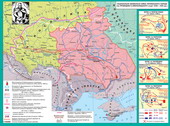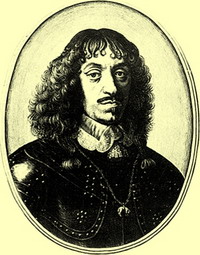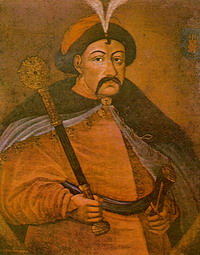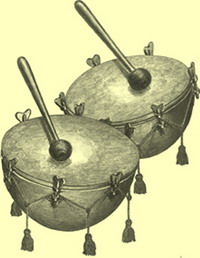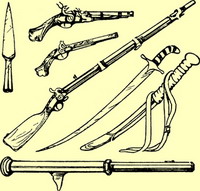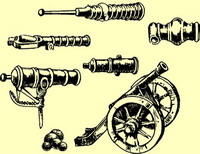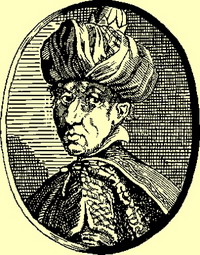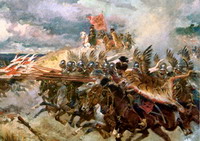BACKGROUND AND START
National War UKRAINIAN PEOPLE against Polish domination
Principal PROCEEDINGS
- National War of the Ukrainian people against Polish domination mid XVII. - Most significant events in history of Ukraine that marked the beginning of a new era in its history.
CHRONOLOGY OF EVENTS
|
1648 January |
Start the National Liberation War. Election of Hetman Bohdan Khmelnytsky. |
|
1648 February |
Khmelnytsky signed a union agreement with the Crimean khan on providing military assistance. |
|
1648 May |
Zhovtovods'ka and Korsun battle. |
NOTE!
core insurgent groups was the Cossacks, who belonged to a leading role in the management and flow of battle. In the ranks of the rebels were many peasants and townspeople, as well as immigrants from small Ukrainian Orthodox gentry. Supported the rebellion and the Orthodox clergy.
war was nationalist, religious, anti feudal character.
purpose of the National Liberation War was:
- destruction of Polish rule;
- ethnic creation of their own state within Ukraine;
- elimination of serfdom, medium and large feudal ownership of land;
- establishment of the Cossack type of management.
Figure
Jan Kazimierz II (1609-1672) - King of the Commonwealth (1648-1668). During his reign the Commonwealth sought to suppress the national liberation war, waged war against Muscovy and Sweden. In September 1668 abdicated. He died in Paris.
BACKGROUND
National War started in 1648 It was a memorable year for European history. It ended just when the Thirty Years' War and Peace of Westphalia was signed. In Sweden it captured the long stretch of almost all navigable rivers of North Germany, France - part of Alsace, the German princes were right to be recognized as independent rulers. Peace of Westphalia consolidated and strengthened the political fragmentation of Germany, led the international recognition of independence of Switzerland and the Netherlands. In England when the revolution began and the second civil war which ended in 1649 execution of King Charles Stewart. In France, the Fronde was - movement against absolutism. Muscovy HAD internal situation, the perturbed events sad times and the defeat of 1634 in Smolensk, which he has suffered from the Commonwealth. Turkey has remained strong, but became increasingly sensible internal crisis, an expression which, in particular, were dynastic upheavals. Pridunayskie principality and the Crimea in terms ofand vassal dependence on Turkey, the first requirement of the latter had put their troops. Powerful rebellion and war swept Spain, Italy, Portugal.
CAUSES National War
After the suppression of the Cossack rebellions of the first quarter of XVII century. increased the colonial policy of Poland to Ukraine, and has caused a national liberation war.
- worsening situation of the peasantry under the dominance of tycoons and panschynno filvarkovoyi-system management:
- rapid enslavement of the peasants;
- increasing serfdom and various forms of refining and taxes in favor of feudal lords and the state;
- tenant farmers increased exploitation of land lords.
- Growing discontent Ukrainian town dwellers, which suffered both from private owners in cities, and from the arbitrariness of royal officials:
- Orthodox townspeople had to settle only in designated neighborhoods;
- limited in their craft and trade occupations;
- eliminated from participation in local government, obtyazhuvaly various taxes and compulsory.
- restriction of rights of the Cossacks, the introduction of measures to eliminate it as a condition:
- with particular cruelty prydushuvalysya any manifestation of Cossacks;
- for "ordinance ..." all the Cossacks, except 6000th registry - since parts of the Polish forces - turned into serfs;
Registered - deprived of their right to choose Hetman and officers - they had to appoint the Polish government of the nobility;
- Zaporozhian placed Polish garrison, the castle was rebuilt Kodak;
- Cossacks prohibited without the consent of the government going to maritime and overland expeditions against the Ottoman Empire and Crimean Khanate. They are obliged to perform all sorts of work, pay onerous taxes.
- Polonization Ukrainian culture, forced planting of Catholicism that caused massive protests:
- Orthodox obligated to pay taxes for the maintenance of the Catholic clergy and are often forbidden to carry out the celebration, to occupy certain positions, to create institutions of higher education, etc.;
- existing closed, banned construction of new Orthodox churches and monasteries, and their possession and confiscated property and Uniate Catholic clergy, instead constructed churches and the Monastery;
- increased number of Jesuit colleges, spreading their influence;
- zvuzhuvalasya field use of the Ukrainian language.
Therefore, measures that the Polish government was accompanied by his domination of the Ukrainian lands were intended to complete their conquest and subjugation, that were colonial. The colonial policy of the Government of the Commonwealth in the middle XVII century. brought the situation in Ukraine, causing a nationwide speech.
Bogdan Khmelnitsky
war of the Ukrainian people against the domination of the Commonwealth led by Bogdan Khmelnitsky .
He was born December 27, 1595 in a family of small Ukrainian nobleman Mikhail Khmelnitsky the family estate in the hamlet Saturday at Chyhyryn.
was in school at one of the monasteries in Kyiv and Lviv in the Jesuit College, so, on the one hand, received a traditional Ukrainian education, on the other - joined to the idea of European events. This combination ozbroyilo Khmelnytsky extensive knowledge of languages - book Ukrainian, Polish, Latin, and also promoted the formation of future hetman.
After returning from the city Khmelnytsky Chigirinskoy joined the hundreds of registered and already in 1620 its stock went into a campaign against the Turks in Moldavia. There, at the Battle of Tsetsorskyh fields captured.
was two years in Turkish captivity, where studied Turkish and Tatar languages. Freed from captivity and returned to service in the regiment Chigirinskogo.
Participated in the Smolensk War 1632-1634 he was an ally of Poland, in marine campaigns against Turkey, he was a Cossack rebellion of 1637-1638
We perform a variety of diplomatic assignments. Specifically, in December 1638 as part of the embassy, which was to achieve mitigation "ordinance ...", met with the Polish king. During 1646-1647 he was again met with the Polish king Ladislaus IV. The meetings discussed the right of participation in hostilities Cossacks against Poland, the Ottoman Empire.
As the facts, Bogdan Khmelnitsky even then preparing an uprising against Poland. To that end, he tried to use the Polish yard plans for war against Turkey, in particular sea trip Cossacks in the Polish army. About designs Khmelnytsky learned the Polish magnates, as evidenced by the events of the future hetman privacy. Disputes with Chigirinsky pidstarostoyu Daniel Chaplinsky through estate on Saturday, which he would select, Khmelnytsky led the summer in 1646 in Warsaw. It is known that King Bogdan received confirmation of their rights to Saturday. But this is not stopped Chaplinsky. In early 1647 he was beaten by the order of Khmelnytsky's son, and in the spring of that year Chaplinsky captured Saturday and expelling family Khmelnitsky. So Bogdan Khmelnitsky own experience convinced that the arbitrariness of the magnates and nobility in the Commonwealth has no limits, and no one but the Cossacks, not protect the rights of the offended people. So he and the nearestCompanions, we are actively preparing the uprising. The intentions were revealed, and in autumn 1647 Khmelnytsky arrested. In mid-December it with a small detachment of Cossacks and son went on Timosha Zaporozhye.
Armed action against POSPOLYTA
In early 1648 Bogdan Khmelnitsky, formed the first rebel group, established connection to the Cossacks of the garrison to Host January 25 and mastered it. He was elected hetman of the Zaporizhzhya Army. These events marked the beginning of the National Liberation War of the Ukrainian people .
Activities Khmelnytsky armed speech preparation:
- sent proclamations to the Ukrainian people with calls to join the Cossack army.;
- established manufacturing gunpowder, organized the purchase of arms and ammunition;
- with the beginning of hostilities agreed on registered Cossacks to move toward the rebels;
- negotiated with Turkey and especially - with the Crimean Khanate.
With the support of Turkey, in February-March 1648 in Bakhchysarai Ukrainian ambassadors made a deal with the Crimean khan Islam-III for military assistance in the war against the Commonwealth.
Thus Hetman solved the problem:
- absence own cavalry;
- avoid surprise attack and Tartar hordes Noghay that it would be especially desirable in time of war against Poland.
START armed struggle against the Commonwealth
Zhovtovods'ka battle (5-6 May 1648)
first battles of the National Liberation War. The rebels surrounded the Polish army under the command of Stefan Potocki on Yellow river water. The decisive attack on the Polish camp started on May 6. He ended with a defeat Poles.
Korsun battle (May 16, 1648)
After the defeat at Yellow Waters 20000th Polish army led by Nicholas of crown hetman Hetman Potocki and Pol'na Martin Kalinowski went to Korsun, where hidden behind the fortified camp. 14 May troops approached the city Khmelnitskogo (Cossacks and Tartars Perekops'ko mirzas Tugay Bey). Portraying preparation for storming the camp, inc compelled to move Polish troops Bohuslav. In marshy tract pea Dubrava May 16 the Polish army, which moved the camp, encountered in ambush (6000th Cossack detachment Maxim Krivonosa). At the same time attack the main forces of Khmelnitsky unit Krivonosa Polish army was destroyed.
Victory at Yellow Waters and Korsun become a signal for uprisings throughout Ukraine and the Ukrainian Liberation Army march westward.
- Bogdan Khmelnitsky troops gathered in the White Church, formed the new Ukrainian authorities and manage right-bank Ukraine liberation from the forces of the Commonwealth has entrusted Colonel Maxim Kryvonos.
- the end of July from the Polish yoke was released the whole territory of the Left Bank, and by the end of August - Bratslav, Kiev, Podolsk (except Kamenets) province on the Right Bank, and eastern and southern districts of Volyn province.
 English
English
